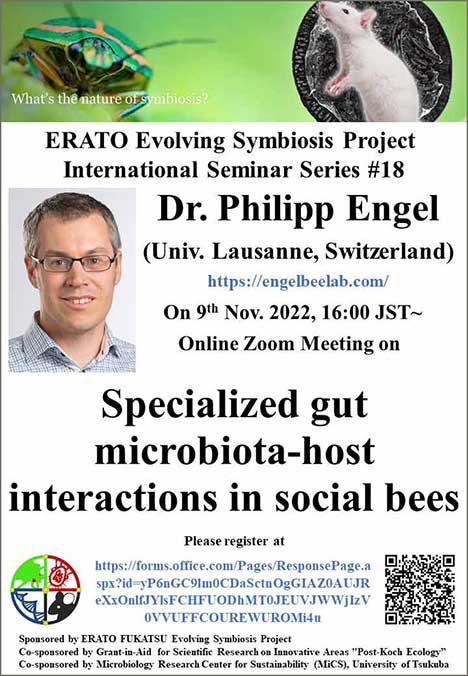第18回共生進化機構国際セミナーをオンライン開催しました。
ミツバチ腸内細菌叢の研究で著名なDr. Philipp Engel(University of Lausanne, Switzerland)にご講演いただきました。

Abstract:Social animals often harbor specialized microbial communities in their gut. Social interactions facilitate the transmission of gut symbionts from one generation to the next resulting in host-restricted microbial evolution, diversification, and adaptation to distinct ecological niches in the gut. However, the complex nature of gut microbial communities is a formidable challenge to study these eco-evolutionary processes. Moreover, whether gut symbionts can modulate the social behavior of the host, and thereby possibly influence their transmission, is currently unknown. Social bees offer fantastic opportunities to study such aspects of microbiota-host interactions. Honey bees, bumble bees, and stingless bees harbor relatively simple, yet specialized gut bacterial communities that are experimentally tractable. In my talk, I will present recent findings from genomics and experimental approaches showing how bee gut symbionts partition the available ecological niches in the honey bee gut. This includes examples of closely related species that have diversified by adapting to different dietary resources as well as bacteria that feed on host-derived nutrients. I will further present results from automated behavioral tracking of honey bee sub-colonies which revealed that the microbiota increases the rate and specialization of social interactions among hosts. These findings demonstrate that the gut microbiota can modulate emergent group-level behaviors of animals. Such microbiota effects on social behavior may reinforce the evolution of specialized microbiota-host interactions.
ERATO Evolving Symbiosis Project International Seminar Series #18
第18回共生進化機構国際セミナー
Sponsored by ERATO FUKATSU Evolving Symbiosis Project
主催:ERATO深津共生進化機構プロジェクト
https://www.jst.go.jp/erato/fukatsu/
Co-sponsored by Grant-in-Aid for Scientific Research on Innovative Areas "Post-Koch Ecology”
共催:新学術領域研究「ポストコッホ生態」
https://postkoch.jp/about/
Co-sponsored by Microbiology Research Center for Sustainability (MiCS), University of Tsukuba
共催:筑波大学微生物サステイナビリティ研究センター(MiCS)
https://www.mics.tsukuba.ac.jp/


